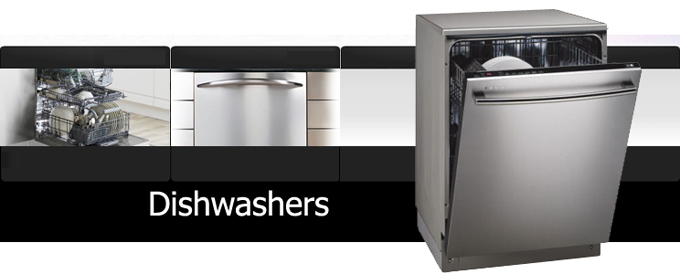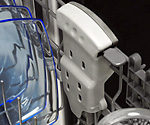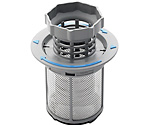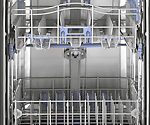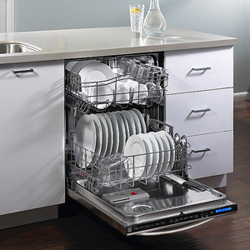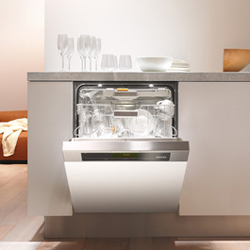The first reports of a mechanical dishwashing device are of an 1830 patent in the United States by Joel Houghton for a hand-powered good device. This device was made of wood and was cranked by hand while water sprayed onto the dishes. This device was both slow and unreliable. Another patent was granted to L.A. Alexander in 1865 that was similar to the first but featured a hand-cranked rack system. Neither device was practical or widely accepted.
Modern dishwashers are descended from the 1887 invention of Josephine Cochrane who invented a new advanced dishwasher, also hand-powered, which she unveiled at the 1893 Chicago World's Fair. Cochrane was quite wealthy and was the granddaughter of John Fitch, the inventor of the steamboat. She never washed dishes herself and invented the dishwasher because her servants were chipping her fine china.
Models installed with permanent plumbing arrived in the 1920s. In England in 1924, William Howard Livens invented a small dishwasher suitable for domestic use. It had many of the features of a modern dishwasher, including a front door for loading, a wire rack to hold crockery and a rotating sprayer.Livens' invention was not, however, a commercial success. Electric drying elements were added in 1940.
Initially home appliances were standalone or portable devices in a kitchen, along with other sinks and the water heater, but with the development of the wall-to-wall countertop and standardized height cabinets, dishwashers evolved into standardized size and shape appliances first integrated with the sink, and then underneath the kitchen countertop as a modular unit.
Adoption was greatest at first in commercial environments, but by the 1970s dishwashers had become commonplace in domestic residences in the US. By 2007, 62 percent of US homes had dishwashers.
| | Adjustable racks and loading aids Racks that adjust up and down, adjustable tines, and silverware and stemware holders let you reconfigure the interior and organize the contents. Those devices increase flexibility, especially when you cook for a crowd, and they can help accommodate large and oddly shaped items. |
Soil sensor
This adjusts the cycles time and water use to the load's soil level, improving efficiency.
Rinse/hold cycle
It lets you rinse dirty dishes before you're ready to start a full cycle. This cycle can reduce odors and prevents soil from setting while you accumulate enough dirty dishes for a full load.
| Filters These keep wash water free of food that could be redeposited on clean dishes. There are two types: self-cleaning and manual. With self-cleaning filters, a grinder pulverizes the debris and flushes it down the drain. That's convenient but noisy. Some models instead have a filter without a grinder. It's quieter, but it needs periodic cleaning, a job that takes a few minutes. | |
Special wash cycles
Most dishwashers come with at least three cycles: light, normal, and heavy (pots and pans). Some offer pot-scrubber, soak/scrub, steam clean, china/crystal, or sanitizing cycles as well. The three basic cycles should be enough for most chores--even for baked-on food. A sanitizing option that raises water temperature above the typical 140 degrees F doesn't necessarily deliver better cleaning.
| | Stainless-steel tub Typically starting at mid-priced models, steel tends to resist staining better than light-colored plastic. Gray-speckled plastic tubs also resist stains and trim the overall cost. Any plastic tub should last longer than most people keep a dishwasher. |
| | Hidden touchpad controls Controls mounted along the top edge of the door are strictly a styling touch. They're hidden when the door is closed. You typically can't see cycle progress at a glance, however. (Partially hidden controls are a good compromise. They show that the machine is running and often display remaining cycle time.) |
Aside from performance in our tests, key dishwasher differences include types, costs, and features. Here are the types of dishwashers to consider.
| Budget-priced conventional dishwashers These are a smart buy if you care more about performance than glitz, and are willing to give up a few convenience features. Pros:As a group, these roughly $500 models clean dishes as well as premium-priced models. Some include adjustable racks and self-cleaning filters. Cons:They tend to be noisier than the upscale models. Fewer flexible-loading features also make loading and accommodating tall items tougher. | |
| Premium-priced conventional dishwashers Pros: These roughly $800-plus models tend to be quieter and have ample flatware slots, folding tines, and other flexible-loading features. Hidden controls and a cycle-time display add style and convenience. Many have a stainless-steel tub, which tends to resist stains better than plastic tubs. Cons: They're typically no better than the best low-priced models at cleaning dishes. |
| Dishwasher-drawer models Pros:These typically include two small, stacked drawers you can use simultaneously or individually. Pull-out drawers also ease loading compared with a typical fold-down door. Cons:They're typically expensive. Relatively small capacities also limit how much you can wash and contribute to lower efficiency as a group. |
Brands
There are dozens of makes and models of dishwashers from many brands. Use this review to compare dishwashers by brand and learn more about some of the leading manufacturers.
Bosch
This highly rated European brand is positioned as the maker of the quietest, most energy-efficient models with features that leave dishes sparkling. The machines are known for their quiet operation and washing ability. The company is introducing a stainless-steel tub that has a nonstainless tub base (gray). Bosch dishwashers also have a manual filter, unlike most of the other brands sold in this country.
Fisher & Paykel
This maker is known for having introduced the dishwasher drawer to the U.S. market.
Frigidaire
This brand is sold mostly at big-box stores, Independent appliance stores, and other national retailers for $300 to $800; the company also makes the Frigidaire Gallery and Frigidaire Professional lines. Frigidaire is known for its least expensive models. It introduced a gray-colored speckled stainproof tub and the Sahara Dry technology on it's models. Frigidaire is owned by Electrolux.
GE
This company, which touts its innovations and features, is the second-biggest dishwasher brand and has four lines: GE, Profile, Café, and Monogram. Prices range from about $250 for a basic GE model to $1,400 for a Monogram product. In 2006, GE introduced the Smart Dispense feature, which automatically dispenses detergent in the right amount for the load and is found on its high-end Profile, Café, and Monogram models. The Café line offers professional-style models at lower prices than the Monogram series.
Kenmore
Kenmore, the largest dishwasher brand in this country, is known for its reliability and dependability and has three lines: Kenmore, Kenmore Elite, and Kenmore Pro. Prices range from approximately $250 for a basic Kenmore model to $1,600 for the double-drawer dishwasher in stainless steel ($1,400 in white). Major features such as the TurboZone power-scrubbing mode tend to be shared among the higher-priced Kenmore models ($650 and up) and the Elite models. Kenmore recently introduced steam cleaning, hidden-control models as well as top-rack-only wash on some Elite models.
KitchenAid
This high-end brand positions itself as maker of heavily featured appliances geared toward the kitchen enthusiasts and sold through independent dealers. The brand includes a model with steam cleaning and will launch a new dishwasher drawer model this year. The line now includes fully integrated displays with function indicator on the front. KitchenAid is known for quiet operation and high cleaning performance.
Maytag
A Whirlpool-owned brand, Maytag introduced a steam model in 2008 and will introduce a dishwasher-drawer model later this year. The company positions its products as durable, but its dishwashers have been relatively repair prone, according to our Annual Product Reliability Survey. Prices range from $300 to $900.
Miele
This European brand, like Asko, makes dishwashers that generally excel in energy efficiency but come at a premium cost.
Whirlpool
Whirlpool, the third-biggest dishwasher brand in the U.S., is known for reliability and reasonably priced models. It has two lines: Whirlpool and Whirlpool Gold. Overall, Whirlpool is known for less-expensive models—prices range from about $250 to $850. The company's PowerScour zone appears on models starting at about $550.
Further Reading:
How to Buy The Right Dishwasher
Written by Dora Men
